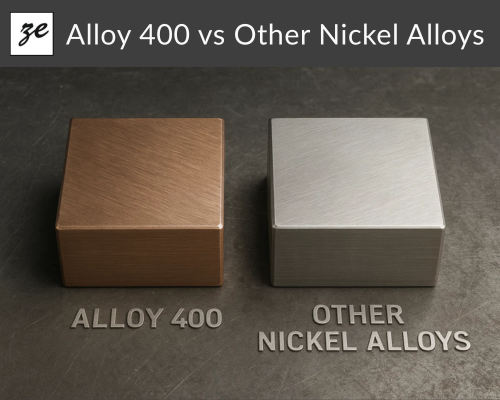Alloy 400 vs Other Nickel Alloys: Complete Comparison
Nickel alloys are essential in industries requiring corrosion resistance, strength, and durability. Among them,Alloy 400. is one of the most versatile options. This article explores Alloy 400 vs other nickel alloys, including properties, advantages, and industrial applications.
What is Alloy 400?
Alloy 400, also called Monel 400, is a nickel-copper alloy containing roughly 63% nickel and 28–34% copper. Small amounts of iron and manganese enhance its mechanical strength.
Key highlights of Alloy 400:
1. Excellent corrosion resistance in seawater, acids, and alkalis
2. Strong and ductile, allowing easy shaping and fabrication
3. Temperature tolerant, suitable for cryogenic to moderately high temperatures
4. Weldable, without compromising its protective properties
Alloy 400 vs Other Nickel Alloys: Key Differences
When comparing Alloy 400 vs other nickel alloys like Alloy 600, Alloy 625, and Alloy 825, consider the following:
1. Corrosion Resistance
Alloy 400 is highly resistant to reducing acids and seawater, whereas alloys like 600 and 625 perform better in oxidizing conditions but may corrode in certain chemical environments.
2. Mechanical Strength
Alloy 625 is stronger at high temperatures, but Alloy 400 balances strength and flexibility, making it ideal for pumps, valves, and marine components.
3. Cost-Effectiveness
Alloy 400 is more affordable than high-performance nickel alloys while offering excellent durability, making it a preferred choice for many industrial applications.
4. Industrial Applications
• Alloy 400: Marine engineering, chemical processing, heat exchangers, and valves
• Alloy 600 & 625: High-temperature chemical reactors, aerospace, and superalloy applications
Why Choose Alloy 400 Over Other Nickel Alloys?
Choosing Alloy 400 depends on your application requirements:
• Balanced corrosion resistance and strength
• Cost-effective for large-scale applications
• Easy fabrication and welding
• Reliable in both marine and chemical environments
At Zeon Exports, we provide high-quality Alloy 400 Nickel Alloys that meet international standards. Our products include sheets, plates, and bars designed for durability and performance.
Benefits of Alloy 400
1. Superior corrosion resistance - withstands acids, alkalis, and seawater
2. High strength and ductility - ideal for structural and mechanical parts.
3. Versatility - suitable for multiple industrial applications
4. Long-term reliability - reduces maintenance and replacement costs
FAQs: Alloy 400 vs Other Nickel Alloys
Q1: What is the main difference between Alloy 400 and other nickel alloys?
Ans. Alloy 400 offers superior resistance in reducing environments and seawater, while other alloys may perform better in oxidizing or high-temperature conditions.
Q2: Where is Alloy 400 commonly used?
Ans. It is used in marine equipment, chemical plants, heat exchangers, and valves due to its balanced strength and corrosion resistance.
Q3: Is Alloy 400 cost-effective compared to Alloy 625?
Ans. Yes, Alloy 400 is generally more affordable while still providing excellent durability and versatility.
Q4: Can Alloy 400 handle extreme temperatures?
Ans. Alloy 400 is suitable for moderate to high temperatures, but for extreme heat, alloys like Alloy 625 are better options.
Q5: Where can I buy Alloy 400 Nickel Alloys?
Ans. You can purchase high-quality Alloy 400 from Zeon Exports. Check products here.


